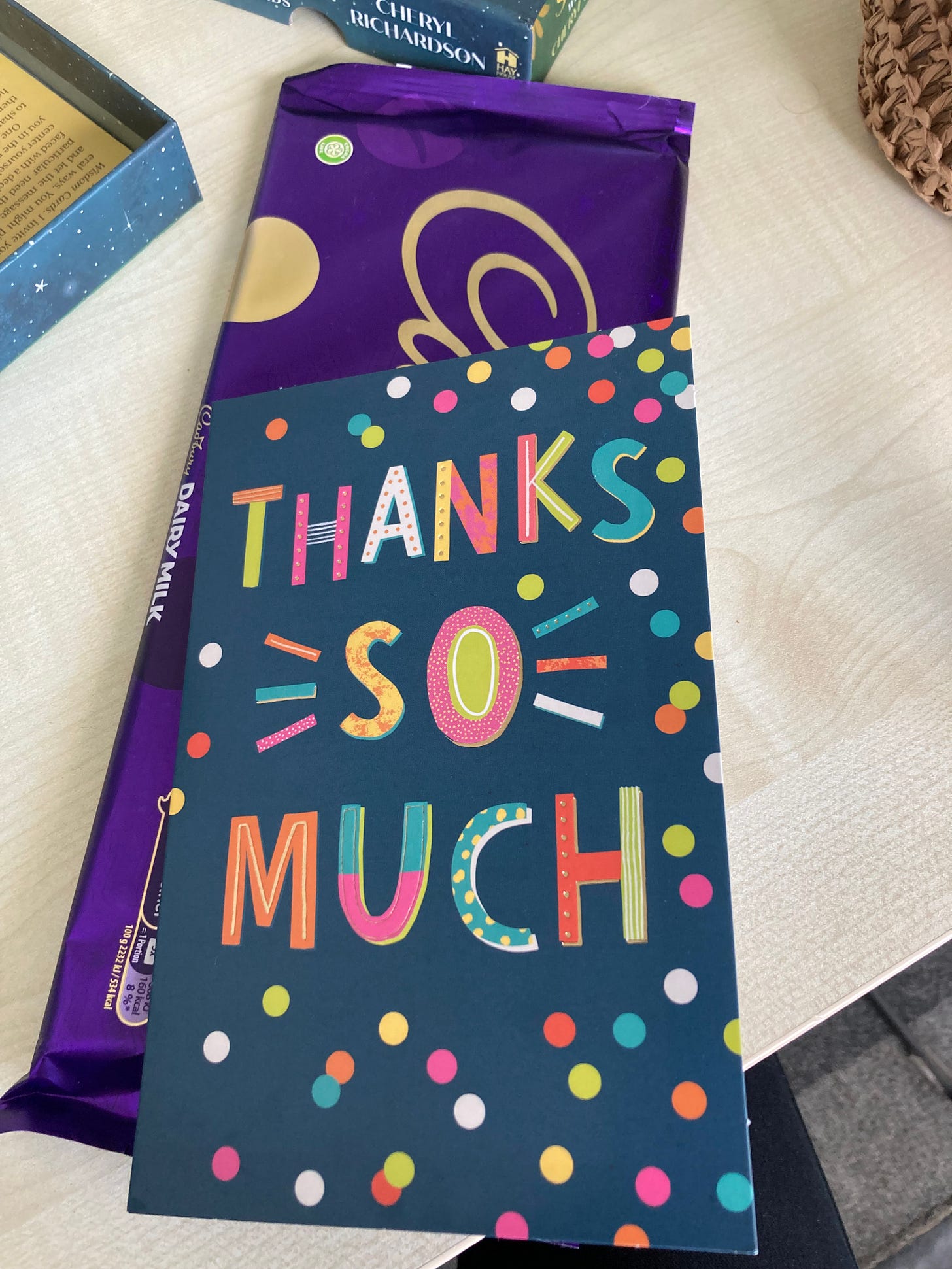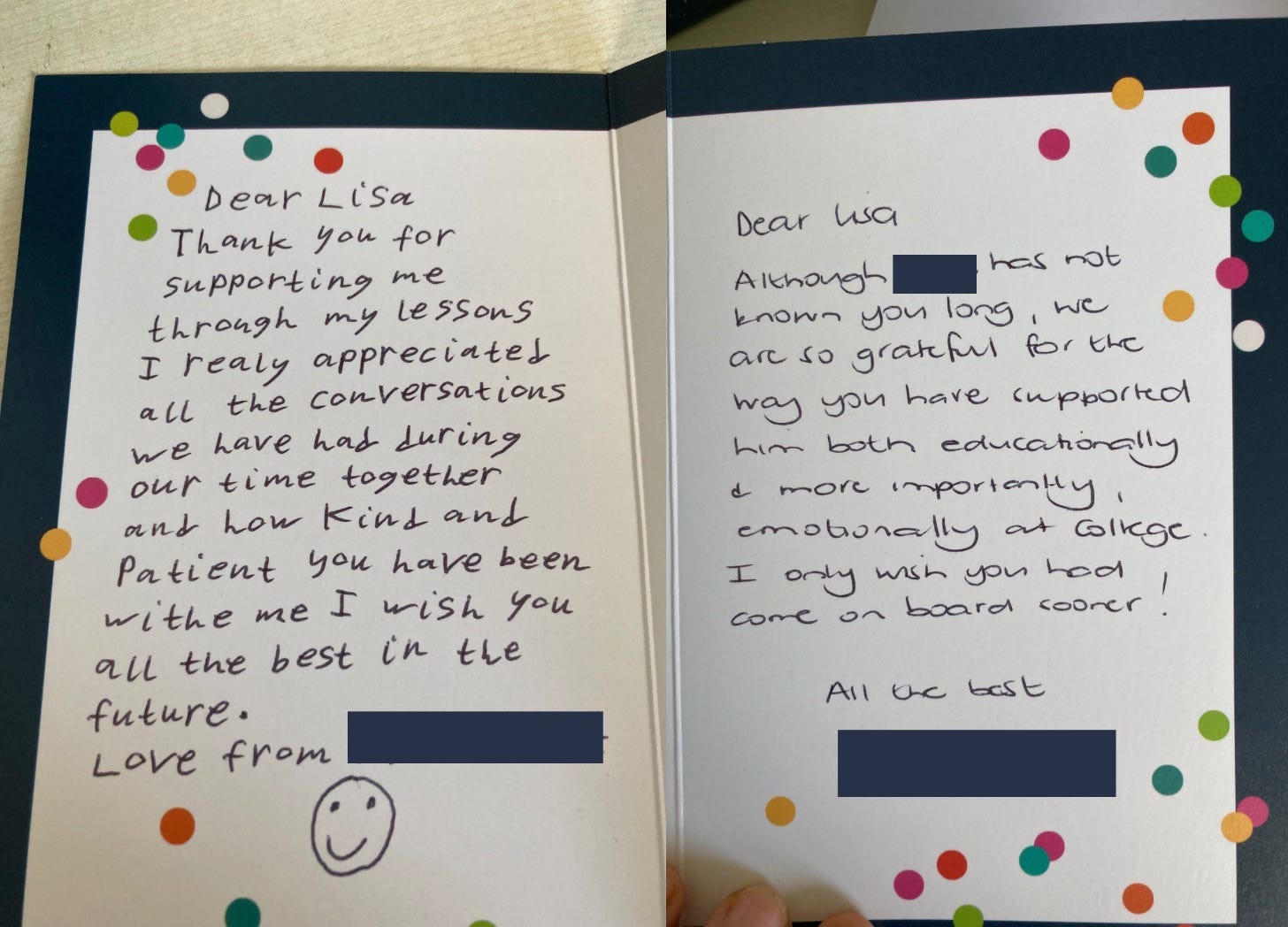Learning Support Assistant: End of term review
My first year at a vocational college working with young adults with high needs.
As I come to the end of my first year in education as a Learning Support Assistant, I’m feeling tired, a little frustrated (at the system) and very proud of how far the students have come.
We started the year with many of them making the transition from secondary school to college. It was tough. They went from rigid structure to more freedom without any guidance. It was like being thrown in at the deep end.
The biggest challenges were hormones, dysregulated nervous systems, wonky timetables, moving classrooms and changing teachers.
Change is triggering for all of us but for highly sensitive and neurodivergent folk, it can send us off into a complete meltdown, especially when we don’t have any prior warning. We need time to slowly find our way.
When we go through change, not only are we starting something new, but we are also saying goodbye to all that is familiar - the kind faces of friends, teachers and knowing our way around the day and the building.
We were a big fish in a small pond, and now we find ourselves at sea.
Here are 12 helpful insights I scribbled in my journal over coffee this morning:
1. It’s worth spending 5 or 10 minutes making small talk before we get the laptops out and start work. Even when you’re met with tumbleweed or a grumpy face.
✔️ How was your weekend? ✔️ Did you visit your Grandma in the end? ✔️ What’s the latest in *insert whatever they are watching on Netflix*
Every day is different and no two students are the same. I quite like that.
Students pretend they don’t want you, but they still need connection (as we all do), so let them push you away sometimes, they will come back. Other times be more assertive with your presence.
Find another way to say ‘Do you need help?’ It’s too vulnerable for many young adults to acknowledge they need help - even though they are learning and not supposed to know it all. This is because, typically in the past when they’ve asked for help, nobody came. They fear rejection. It’s painful. They’ve been repeatedly abandoned - usually emotionally. Either that or they are too proud and think it’s an inadequacy in them. They are armouring up and protecting themselves from the shame of ‘not knowing’. Of course they don’t know, they are still learning…and so are we!
Next term I’m going to be more specific with my help:
✔️ Would you like me to proofread that? ✔️ What are you working on today? ✔️Shall we read it together? ✔️ Let’s do five minutes and then go outside for a walk. ✔️ That’s a tricky one to spell, let me have a go! ✔️ You look puzzled, can I take a look? ✔️ I’m finding this one tricky too, let’s have a break and come back to it.
Sometimes you feel as if you’re not making a difference, but even when you can’t see it, trust the process. It’s all about securing the relationship. At the beginning of term there was low attendance, resistance to listen and not participating in lessons. We finished the term in a very different place. This safe and secure foundation was built by making micro connections on the daily.
Sometimes you don’t need to say anything, you just show up consistently with a smile. Your gentle presence is enough. Don’t rush them. It’s a lesson in patience. My goal wasn’t to get a much work done as possible because that creates pressure. My goal was to slowly connect and build trust.
When students get distracted, just kindly name it. ‘I’ve noticed that you want to move around alot today. It’s hard to stay focussed, isn’t it?’ Then shut up and let them talk.
Celebrate their successes. Reassure them when they get it wrong and praise them for having a go. Notice the the tiny wins like respectful and polite behaviour, showing up on time, completing a task, being helpful or making a contribution to the lesson.
Creativity and play wins every time. Laugh with them. We’ve had a lot of unpredictable drama this term but also so much laughter. Mostly from playing hangman … rude words are still funny! 😉
Slow start up for tricky conversations when they are avoidant. Avoidance is fear, and in these instances they need to feel safe. ‘I’m not cross with you. I’m not going to tell you off. You’re not in trouble. I care about you and want you to do well. Let’s find a way.’
Do not chase them. I didn’t do this but I watched a teacher do it with horrible consequences. Honestly, if you prioritise the relationship by creating a safe and nurturing learning environment, they will come to you. Students would openly share with me ‘We love our Thursdays with you.’ They would ask: “Miss, will you be in our class tomorrow?’
💕 Looking for Teen 1:1 Support
For overwhelmed highly sensitive and neurodivergent teens, who are looking for their place in the world. They may feel alone or struggle with social anxiety. They may have been bullied or find themselves drawn to frenemies or situationships where they are valued or seen. Perhaps they need support with exam stress or want to prepare when they make the transition from secondary school to college.
I tend to work with neurodivergent young people, but I do not see people as ‘labels’. I work with holistically with their body, mind and spirit.
✏️ Looking for some back to school confidence?
For over a decade I worked with 7-11 year olds helping them make transitions from middle to secondary school. Here is my fun and effective workshop / support pack to help children return to school with a smile. It doesn’t just work for those of you changing schools, but can also help those of you :
✔️who have lost your love of learning
✔️ who worry about school a lot
✔️ get Sunday night blues
✔️ get angry about homework
✔️ are nervous about tests and exams.
It includes easy to follow guidance notes and videos for parents who want to provide the best support when navigating these choppy waters.






